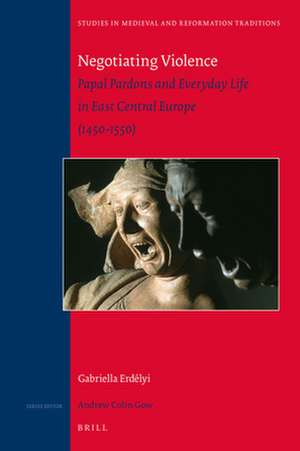Negotiating Violence: Papal Pardons and Everyday Life in East Central Europe (1450-1550): Studies in Medieval and Reformation Traditions, cartea 213
Autor Gabriella Erdélyien Limba Engleză Hardback – 4 iul 2018
Din seria Studies in Medieval and Reformation Traditions
- 18%
 Preț: 931.15 lei
Preț: 931.15 lei - 18%
 Preț: 836.98 lei
Preț: 836.98 lei - 18%
 Preț: 1002.58 lei
Preț: 1002.58 lei - 18%
 Preț: 1137.44 lei
Preț: 1137.44 lei - 18%
 Preț: 654.86 lei
Preț: 654.86 lei - 18%
 Preț: 656.52 lei
Preț: 656.52 lei - 18%
 Preț: 1100.47 lei
Preț: 1100.47 lei - 18%
 Preț: 703.08 lei
Preț: 703.08 lei - 18%
 Preț: 708.44 lei
Preț: 708.44 lei - 18%
 Preț: 707.11 lei
Preț: 707.11 lei - 18%
 Preț: 651.15 lei
Preț: 651.15 lei - 18%
 Preț: 664.09 lei
Preț: 664.09 lei - 18%
 Preț: 652.32 lei
Preț: 652.32 lei - 18%
 Preț: 643.36 lei
Preț: 643.36 lei - 18%
 Preț: 651.47 lei
Preț: 651.47 lei - 18%
 Preț: 654.24 lei
Preț: 654.24 lei - 18%
 Preț: 653.09 lei
Preț: 653.09 lei - 18%
 Preț: 697.15 lei
Preț: 697.15 lei - 18%
 Preț: 692.88 lei
Preț: 692.88 lei - 18%
 Preț: 654.24 lei
Preț: 654.24 lei - 18%
 Preț: 694.20 lei
Preț: 694.20 lei - 18%
 Preț: 702.83 lei
Preț: 702.83 lei - 18%
 Preț: 694.27 lei
Preț: 694.27 lei - 18%
 Preț: 691.83 lei
Preț: 691.83 lei - 18%
 Preț: 693.65 lei
Preț: 693.65 lei - 18%
 Preț: 699.78 lei
Preț: 699.78 lei - 18%
 Preț: 699.57 lei
Preț: 699.57 lei - 18%
 Preț: 692.09 lei
Preț: 692.09 lei - 18%
 Preț: 691.71 lei
Preț: 691.71 lei - 18%
 Preț: 691.40 lei
Preț: 691.40 lei - 18%
 Preț: 692.88 lei
Preț: 692.88 lei - 18%
 Preț: 693.65 lei
Preț: 693.65 lei - 18%
 Preț: 694.82 lei
Preț: 694.82 lei - 18%
 Preț: 690.92 lei
Preț: 690.92 lei - 18%
 Preț: 694.82 lei
Preț: 694.82 lei - 18%
 Preț: 693.33 lei
Preț: 693.33 lei - 18%
 Preț: 1371.28 lei
Preț: 1371.28 lei - 18%
 Preț: 699.11 lei
Preț: 699.11 lei - 18%
 Preț: 690.54 lei
Preț: 690.54 lei - 18%
 Preț: 931.01 lei
Preț: 931.01 lei - 18%
 Preț: 692.88 lei
Preț: 692.88 lei - 18%
 Preț: 897.11 lei
Preț: 897.11 lei - 18%
 Preț: 687.25 lei
Preț: 687.25 lei - 18%
 Preț: 682.56 lei
Preț: 682.56 lei - 18%
 Preț: 685.38 lei
Preț: 685.38 lei - 18%
 Preț: 874.91 lei
Preț: 874.91 lei - 18%
 Preț: 663.60 lei
Preț: 663.60 lei - 18%
 Preț: 663.60 lei
Preț: 663.60 lei - 18%
 Preț: 665.54 lei
Preț: 665.54 lei
Preț: 714.23 lei
Preț vechi: 871.02 lei
-18% Nou
Puncte Express: 1071
Preț estimativ în valută:
136.66€ • 142.69$ • 113.11£
136.66€ • 142.69$ • 113.11£
Carte indisponibilă temporar
Doresc să fiu notificat când acest titlu va fi disponibil:
Se trimite...
Preluare comenzi: 021 569.72.76
Specificații
ISBN-13: 9789004361157
ISBN-10: 9004361154
Dimensiuni: 155 x 235 mm
Greutate: 0 kg
Editura: Brill
Colecția Brill
Seria Studies in Medieval and Reformation Traditions
ISBN-10: 9004361154
Dimensiuni: 155 x 235 mm
Greutate: 0 kg
Editura: Brill
Colecția Brill
Seria Studies in Medieval and Reformation Traditions
Cuprins
AcknowledgementsList of Maps and Illustrations1 IntroductionResearch Agenda The Uses of Papal Pardon2 Negotiating ApostasyApostates and Evangelicals Cloisters and Learning The Ambitious Common Man Storytelling Strategies Gaps in the Narrative Conclusion3 The Gates of Upward Social MobilityThe Social Origin of the Friars Choosing the Cloister Learning in the Cloister Schools Learning in the Parish Schools The Protean Literacy of the Lesser Clergy Conclusion4 From Savage to Civilized: Village Schools and Student LifeThe Interactions of Students and Locals The Dense Network of Parish Schools in the Countryside The Presence of Literate and “Civilized” Men in Rural Communities Conclusion5 Life Outside the Walls: Clergymen on the RoadThe Parish Church and Cloister in the Community Masses of Unbeneficed Clergy The Unbeneficed as Criminals Parish Incumbents and the Unbeneficed Ordained in Rome Conclusion6 The Heyday of Popular Culture: The Shared Time and Space of Laity and ClergyDefending Male Honor Shared Spaces of Leisure Carnival Every Day Shared Practices Leisure and Crime in the Dark Festivities and Violence Shared Concepts of Magic Conclusion7 Contested Coexistence: Lay-Clerical Disputes and Their SettlementEnmities and the Language of Emotions Clergymen as the Mediators of the Sacred Clergymen as Members of Local Communities Honor and Hatred: The Script of Lay-Clerical Conflicts The Communal Definition of Criminals Conclusion8 Tales of a Peasant RevoltTwo Competing Myths of Just War Representations of Violence: Private and Public Perspectives György Dózsa, the Martyrb>9 Shifting Identities in the Christian-Muslim Contact Zone “Apostate” Spouses Christian “Bigamists” Latin and Orthodox Christian Intermarriages Conclusionb>10 ConclusionBibliographyIndex
Recenzii
“An introduction to a part of the world and its local scholarly literature seldom visited by western scholars, with well-chosen illustrations often reproduced in brilliant colour”.
– Jus Gentium, Vol. 4, No. 2 (July 2019), pp. 756-757.
– Jus Gentium, Vol. 4, No. 2 (July 2019), pp. 756-757.
Notă biografică
Gabriella Erdélyi is Permanent Senior Research Fellow at the Institute of History of the Hungarian Academy of Sciences. She has published A Cloister on Trial. Religious Culture and Everyday Life in Late Medieval Hungary (Ashgate, 2015) and edited Armed Memory. Agency and Peasant Revolts in Central and Southern Europe (1450–1700) (V&R, 2016).
